
Dark River is a 1952 Argentine drama film directed by Hugo del Carril, starring del Carril, Adriana Benetti and Raúl del Valle. It is based on a novel by Alfredo Varela. The storyline is about exploitation of peons, and the film has a populist message that ties in with the director's sympathy for Peronism. The film won the Silver Condor Award for Best Film.

Allá donde muere el viento is a 1976 Argentine drama film directed by Fernando Siro and written by Enrique Torres. The film stars John Russell, Tippi Hedren and Mala Powers.
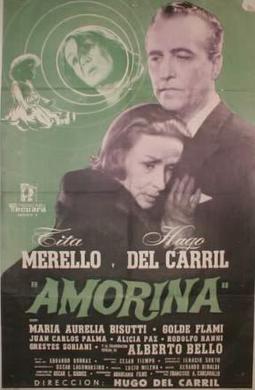
Amorina is a 1961 Argentine black and white film directed by Hugo del Carril and written by César Tiempo. It is based on a play by Eduardo Borrás. It stars Hugo del Carril and Tita Merello.

Pierre Bruno Hugo Fontana, otherwise known as Hugo del Carril, was an Argentine film actor, film director and tango singer of the classic era.
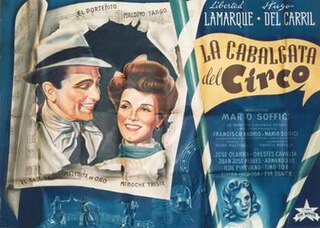
The Circus Cavalcade is a 1945 Argentine musical film directed and written by Mario Soffici with Eduardo Boneo and Francisco Madrid. The film was shot on black-and-white stock with a monaural soundtrack. It stars Libertad Lamarque and Hugo del Carril.
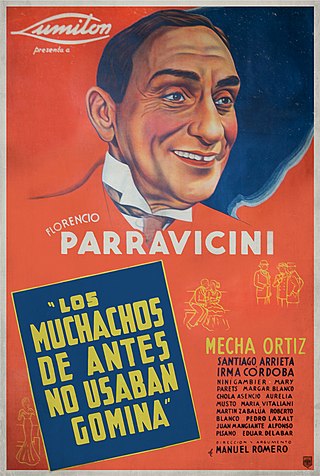
The Boys Didn't Wear Hair Gel Before is a 1937 Argentine historical drama film directed and written by Manuel Romero and starring Florencio Parravicini, Mecha Ortiz and Santiago Arrieta.
Confesión is a 1940 Argentine musical drama film directed by Luis Moglia Barth and starring Hugo del Carril, Alberto Vila, and Alita Román.

When the Heart Sings is a 1941 Argentine musical drama film directed by Richard Harlan and starring Hugo del Carril, Aída Luz and José Olarra. A man from a wealthy background meets and marries an actress despite fierce opposition from his family.

Culpable is a 1960 Argentine crime drama directed and starring Hugo del Carril. The film was based on a play by Eduardo Borrás. The film starred Mario Soffici and Silvia Legrand.

María Aurelia Bisutti was an Argentine film and TV actress, with over 50 Argentine cinema and television credits between 1948 and 1993, as well as numerous roles in the theatre.

Mariano Alberto Martínez, known professionally as Mariano Mores, was an Argentine tango composer and pianist.
La quintrala is a 1955 Argentine drama film directed by Hugo del Carril. It won the Silver Condor Award for Best Film.

La serpiente de cascabel is a 1948 Argentine comedy film, directed by Carlos Schlieper and written by Eduardo Antón and Ariel Cortazzo. It was premiered on March 17, 1948.

White Horse Inn is a 1948 Argentine musical comedy film directed by Benito Perojo and written by Juan Carlos Muello based upon the homonymous opera White Horse Inn by Ralph Benatzky and Robert Stolz. It was premiered on April 15, 1948.

The Englishman of the Bones is a 1940 Argentine drama film based on a novel of the same name.
By the Light of a Star is a 1941 Argentine musical drama film directed by Enrique Santos Discépolo and starring Hugo del Carril, Ana María Lynch and María Esther Gamas. It is a tango film, an extremely popular genre during the Golden Age of Argentine Cinema.
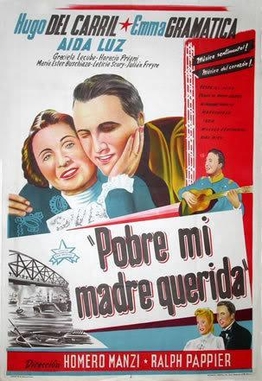
My Poor Beloved Mother is a 1948 Argentine drama film directed by Homero Manzi and Ralph Pappier and starring Hugo del Carril, Emma Gramatica, and Aída Luz. It was based on a tango of the same name by Pascual Contursi and José Betinotti.
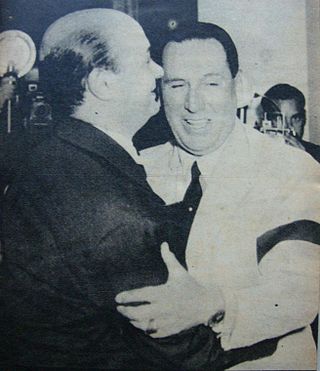
Ovidio Cátulo González Castillo was an Argentine poet and tango music composer. He was the author of many famous works, such as Organito de la tarde, El aguacero, Tinta roja and Caserón de tejas, María and La última curda, and El último café. The tango La calesita, which he composed with Mariano Mores, inspired the film of the same name directed in 1962 by Hugo del Carril.
Story of a Poor Young Man is a 1942 Argentine historical drama film directed by Luis Bayón Herrera and starring Hugo del Carril, Santiago Gómez Cou and Nélida Bilbao. It is based on the 1858 French novel of the same title by Octave Feuillet, which was later adapted again in 1968. The film's sets were designed by Juan Manuel Concado. It was released during what is considered to be the Golden Age of Argentine Cinema.

Fanny Navarro was an Argentine actress. She starred in films such as Melodías porteñas (1937), Doce mujeres (1939), Ambición (1939), El hijo del barrio (1940), Hogar, dulce hogar (1941), Dos ángeles y un pecador (1945), Marihuana (1950), Deshonra (1952), Marta Ferrari (1956) and La Calesita (1969). Navarro was the girlfriend of Eva Perón's brother, and she was selected by Perón to head the Peronist foundation for actresses. Navarro once lost the only copy of a script written for Leopoldo Marechal's play Antigona Verez; Marechal was ordered to rewrite the entire thing.















